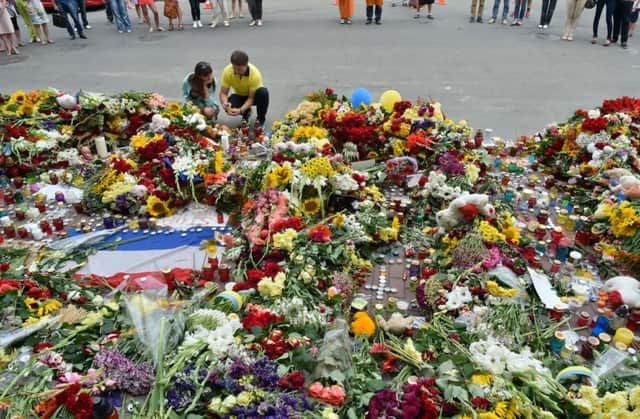Euan McColm: The aftermath of MH17 disaster


Things have, quite clearly, not played out that way.
The downing of Malaysia Airlines flight MH17 over Ukraine in what appears to have been an attack by pro-Russian separatists is an act of horror that would have done credit to the very darkest days of the old union.
Russian president Vladimir Putin – who has funded and armed rebels in Ukraine – may have the blood of 298 people, 80 of whom were children, on his hands. Post-Soviet Russia is not the nation we hoped it might be.
Advertisement
Hide AdAdvertisement
Hide AdThe death two weeks ago of Eduard Shevardnadze came as a stark reminder that Russia seems bereft of moderate voices in 2014.
Shevardnadze, Soviet foreign minister between 1985-91, was a key ally of Mikhail Gorbachev, the leader who began the political transformation that would break the Soviet Union apart.
While it might be naive to imagine that a long-standing Communist Party official such as Shevardnadze shared no responsibility for the oppression suffered by so many Soviet citizens, history judges him to have been a crucial figure in Gorbachev’s reforming administration.
When Gorbachev came to power in 1985, the Soviet Union was an alien place to the West. His policies of glasnost (openness) and perestroika (restructuring) marked a bold new direction for the sprawling union.
Pragmatic and, yes, courageous, Gorbachev and his closest political allies recognised that the political project in which they were all involved (or, perhaps more accurately, given the terrible suffering caused in its name, complicit) was neither working nor likely to in an ever more connected world.
These men were peacemakers. They saw that Soviet isolation was damaging to the interests of the people. We cannot underestimate the magnitude of the change they began to drive through (pre-Gorbachev, those of you of a certain age will recall, we were often unsure even whether a serving Soviet leader was alive or not).
Shevardnadze died as the legacy of the work he and others began lay in ruins.
Our optimism of little more than 20 years ago was misplaced. The Soviet Union may no longer exist as an international bogeyman, but Putin’s Russia is as corrupt and terrifying as that failed project was.
Advertisement
Hide AdAdvertisement
Hide AdThe Russian president swiftly laid the blame for Thursday’s atrocity at the feet of Ukraine, which is locked in a battle with separatists who wish to see power handed over to Moscow. If his opponents hadn’t engaged in conflict, none of this would have happened.
But Putin’s “they-were-asking-for-it” response is hardly likely to placate an international community already struggling to keep things diplomatic.
World leaders may so far be focused on the need for answers. Until the investigation demanded by all is complete, we will not know for sure whether the missile which brought down the plane was indeed fired by Russian-funded rebels or Ukrainian forces.
But an answer will emerge and when it does there will be some reckoning. The murder of a nation’s citizens by agents of another state is as valid a reason for war as any. This is a matter of the gravest seriousness.
Crucial to how things unfold is Putin. We once laughed at him in the West. How comforting it was to look at photos of him bare-chested and hunting and laugh at this jumped-up little man. Now, the joke is over.
Putin called for a ceasefire on Friday, while the attack on the Malaysian Airlines plane is investigated. This certainly suggests that he understands the potentially huge ramifications for Russia of what has taken place.
It may be that the senseless murder of 298 people is enough to take the heat out of the situation in Ukraine for longer.
But what happens when we know for sure who was behind the killings?
Advertisement
Hide AdAdvertisement
Hide AdIf it was an act carried out by Moscow-funded mercenaries then, under Putin, we are dealing with a rogue state which can only become more isolated.
If the Russian president has funded these murders, then what business can any other nation do with him? What bridges can be rebuilt?
Ruthless and aggressive, Putin does not appear to be the sort of politician who might easily walk away from power. He is a “democratic” leader with all the brutal self-interest of the many dictators who preceded him.
The shooting down of MH17 has created global tensions which grow ever stronger. It was an outrage for which it is difficult to see a response that doesn’t escalate conflict.
Of course, the truth is that change cannot be imposed on Russia. Sanctions – and threats of more sanctions – seem not to pierce Putin’s hide. But the world will pay a price if the West is forced to speak to him in the only language he seems to understand.
It’s less than quarter of a century since we saw the beginning of a new Russian revolution, one which was about breaking down walls and working in partnership with former adversaries. And, for a while, it seemed like the rebalancing of the relationship between Russia and the rest of the world would endure. But, today, that feels like many lifetimes ago.
Russia created the conflict which led to the missile attack on Thursday. And in doing so, it has declared itself an international outsider.
What we must hope is that, even now, there are those around Putin who recall the reasons Gorbachev, Shevardnadze and others began the reforms that preceded the end of the Soviet Union. Russia is led by a man of extreme views, willing to take extreme actions. The world will be a safer place without him holding power.
But that won’t happen soon unless courageous moderates step forward in Russia. «
Twitter: @euanmccolm